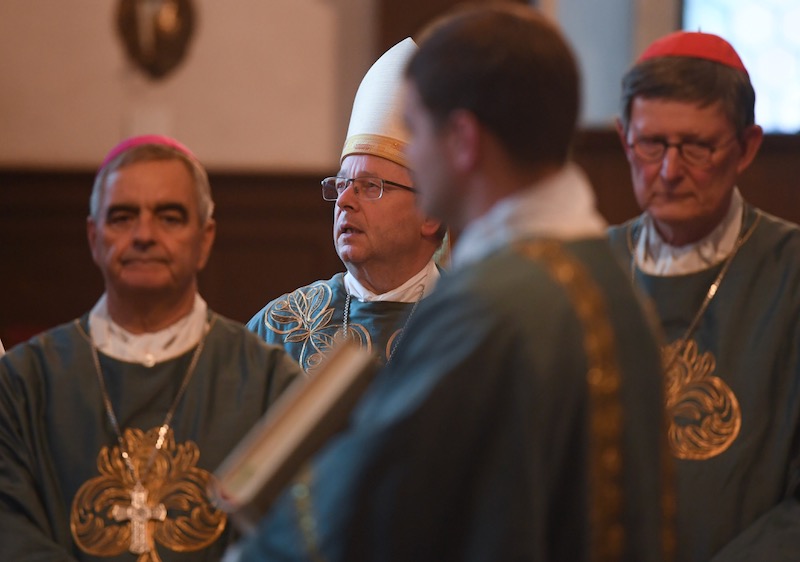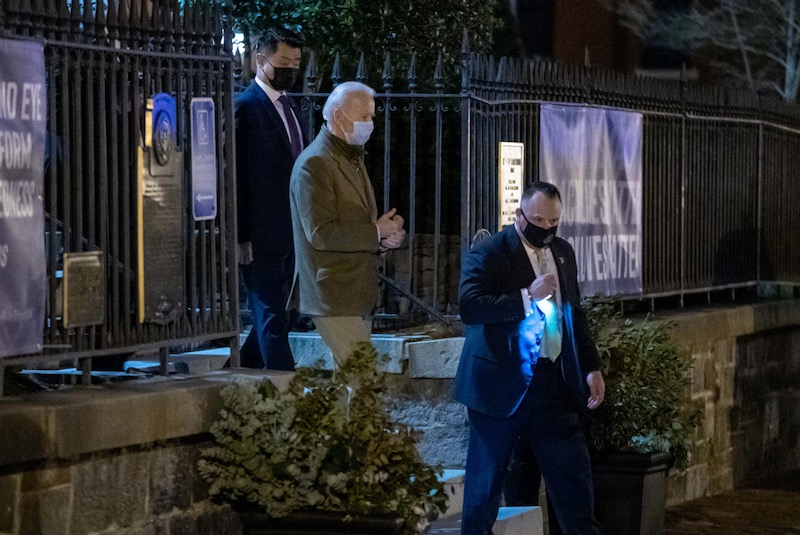The annual March for Life, the largest pro-life protest in the country, was forced to go virtual this year due to the pandemic. A small group of pro-life activists congregated on the National Mall, and marched to the US Supreme Court, while others marched to a Planned Parenthood facility.
At a Mass at St Matthew’s Cathedral, Cardinal Wilton Gregory revived the consistent ethic of life approach advocated by his mentor, the late Chicago Cardinal Joseph Bernardin. “Today we find ourselves hopelessly mired in defective excuses that now extend to other acts of brutality against the terminally ill and ageing, the immigrant seeking a better life, against prisoners who may have committed heinous crimes but are still human beings,” Gregory told the congregation.
“We tell ourselves that capital punishment prevents crimes and that some horrible criminals deserve to die even as we continue to learn that too many convicted persons have been sentenced to death and later exonerated by DNA tests or whose very trials have been judged to be unfair or biased.”
The night before the march, the Vigil for Life was televised from the National Shrine of the Immaculate Conception. Archbishop Joseph Naumann, chair of the pro-life activities committee of the bishops’ conference, delivered a fiery sermon denouncing President Joe Biden in the nearly empty church.
Typically, buses filled with Catholic schoolchildren come to Washington and fill the Basilica, camping out in sleeping bags in the undercroft. Some protesters lamented the election results. Michael New, a professor at Catholic University, recalled President Donald Trump speaking at last year’s rally. “The fact that [Trump] was willing to promote the movement and put it front and centre did so much for us,” he said.
Others disagreed. Terrisa Bukovinac, president of Democrats for Life of America, said: “The affiliation with [Donald] Trump is detrimental in the long term to changing hearts and minds.”
President Biden is a committed Catholic: for the second time since his inauguration, he attended Mass at Holy Trinity parish in the Georgetown section of Washington DC last weekend. On his first Sunday in office, he attended morning Mass and last weekend he attended a Vigil Mass on Saturday. Holy Trinity is the oldest parish in the city and is staffed by the Society of Jesus which also runs nearby Georgetown University. The Biden family frequented the parish during his eight years as vice president.
Many bishops however are not happy because of his position on abortion.
The US bishops’ conference is planning a statement on “Eucharistic coherence” according to a letter sent by Archbishop Jose Gomez, president of the conference, to all bishops. The letter accompanied the statement Gomez issued on Inauguration Day last month, and was sent to the nation’s bishops the night before.
Both the statement and the proposed document were the fruit of the working group Gomez established at the end of the bishops’ November plenary meeting to address what he called the “difficult and complex situation” of a pro-choice Catholic president.
Chicago Cardinal Blase Cupich, who publicly criticised the inauguration day statement as “ill- considered”, was received by Pope Francis last Saturday. Cupich was in Rome for a meeting of the Congregation for Bishops.
A column by well known Catholic author George Weigel said Cupich and Newark Cardinal Joseph Tobin “put intense pressure” on Gomez not to make the statement, as did the Apostolic Nuncio, Archbishop Christophe Pierre.
The bishops’ conference never announced the composition of the working group and some high-ranking prelates were left in the dark about which committee chairs served on the body.
Gomez had announced in November that the group would be led by the Vice President of the conference, Detroit Archbishop Allen Vigneron.
The National Catholic Reporter was the first to report that the working group consisted of nine committee chairs: Cardinal Timothy Dolan of New York, chair of the Religious Liberty committee; Archbishop Salvatore Cordileone of San Francisco, chair of the Laity, Marriage, Family Life and Youth committee; Oklahoma City Archbishop Paul Coakley, chair of the committee on Domestic Justice; Archbishop Joseph Naumann of Kansas City, Kansas, chair of the Pro-Life Activities committee; Milwaukee Archbishop Jerome Listecki, chair-elect of the Canonical Affairs and Church Governance committee; Bishop Kevin Rhoades of Fort Wayne- South Bend, Indiana, chair of the Doctrine committee; Oakland, California Bishop Michael Barber, chair of the committee on Catholic Education, Arlington, Virginia Bishop Michael Burbidge, chair of the Communications committee; and Washington, D.C. Auxiliary Bishop Mario Dorsonville, chair of the Committee on Migration and Refugee Services.



 Loading ...
Loading ...